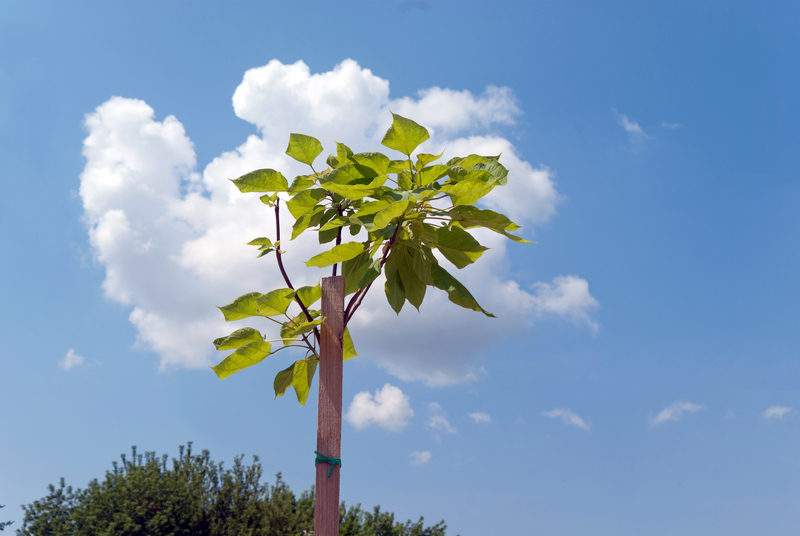Waste to Wealth: Soil Transformation
Posted on 01/07/2025
Waste to Wealth: Soil Transformation
The modern world faces a paradox: while we generate growing quantities of waste, we also struggle with soil degradation and loss of fertility. However, the concept of waste to wealth highlights a solution that addresses both issues simultaneously. By transforming waste into valuable soil amendments, communities and industries can create a sustainable cycle that fuels agricultural productivity and environmental restoration. This comprehensive guide explores the process of soil transformation through waste conversion, the technologies involved, ecological benefits, and ways individuals and organizations can participate in this movement.

Understanding Waste to Wealth in Soil Transformation
What is Soil Transformation?
Soil transformation refers to a set of practices and technologies that convert organic and some inorganic wastes into valuable resources designed to improve soil health. This process encompasses composting, vermiculture, biochar production, and industrial symbiosis, among others. Through proper techniques, organic waste--from kitchen scraps and yard trimmings to agricultural residues--can be harnessed to boost soil fertility, structure, and microbial diversity.
The Global Context: Turning Waste into Wealth
Waste generation is a growing problem worldwide. According to the World Bank, the world produces over 2 billion tons of municipal solid waste annually. Yet, a significant portion--nearly 40%--is organic and suitable for recycling through soil transformation. Instead of ending up in landfills and contributing to greenhouse gas emissions, this waste can become a wealth-generating resource for farmers, gardeners, and entire communities.
How Waste to Wealth Works: The Science of Soil Enrichment
Types of Waste Suitable for Soil Transformation
- Food Scraps: Vegetable peels, fruit waste, kitchen leftovers, eggshells.
- Yard Trimmings: Grass clippings, leaves, branches.
- Agricultural Residues: Straw, husks, manure.
- Industrial Organic Byproducts: Brewery grains, food processing sludge.
- Municipal Green Waste: Collected leaves, wood chips, and other biodegradable materials from urban settings.
Core Techniques in Soil Transformation from Waste
- Composting: A natural decomposition process where microorganisms break down organic matter, creating humus-rich compost. This method requires balancing "green" high-nitrogen wastes with "brown" high-carbon materials.
- Vermiculture (Vermicomposting): The use of earthworms, especially red wigglers, to process organic waste and produce nutrient-dense worm castings that enrich soil.
- Biochar Production: Heating organic waste in low-oxygen environments (pyrolysis) generates biochar--a stable form of carbon that enhances soil structure, water retention, and microbial activity.
- Black Soldier Fly Farming: Utilizing larvae to convert organic waste into protein-rich animal feed while producing a frass byproduct that improves soil fertility.
- Industrial Symbiosis: Some industries repurpose byproducts or treated waste (like pulp and paper sludge) for use in large-scale soil reclamation projects.
Benefits of Waste to Wealth Approaches in Soil Management
1. Enhanced Soil Fertility
Waste-based amendments provide essential macronutrients (nitrogen, phosphorus, potassium) and micronutrients often absent from synthetic fertilizers. They stimulate soil microbial communities, which are critical for nutrient cycling and plant growth.
2. Improved Soil Structure and Water Retention
Organic matter from compost, biochar, or worm castings improves aeration, drainage, and water-holding capacity, reducing water stress in crops and helping soils withstand extreme weather.
3. Waste Diversion and Landfill Reduction
Transforming waste into wealth diverts degradable material from landfills, lowering methane emissions and reducing pollution risks associated with improper disposal.
4. Climate Change Mitigation
Soil transformation processes like composting and especially biochar production can sequester carbon, locking it in soils for decades or centuries. Healthy soils also act as greater carbon sinks.
5. Economic Development and Job Creation
Waste-to-wealth initiatives create new industries around waste collection, processing, and soil amendment sales. Small farmers, cooperatives, and urban entrepreneurs can all benefit from the growing demand for organic soil enhancers.
Modern Technologies in Soil Transformation
Innovative Composting Systems
- In-vessel composting: Enclosed systems that tightly control temperature, moisture, and aeration, speeding up the decomposition process and minimizing odor.
- Bokashi fermentation: An anaerobic process using specific microbes to pre-ferment food waste for faster final composting.
Biochar Reactors and Gasifiers
Advancements in pyrolysis equipment allow efficient conversion of crop residues, forestry waste, and even municipal sludge into biochar at various scales, from backyard operations to industrial plants.
Automated Sorting and Processing
AI-enhanced sorting facilities separate organics at the source, while mechanical and biological treatment plants further refine waste streams for maximum soil health impact.
Mobile Vermiculture Units
Compact composting and vermiculture kits make it simple for urban residents, schools, or community gardens to participate in waste-to-soil conversion.
From Waste to Fertile Fields: Success Stories Worldwide
Urban Agriculture in African Cities
Cities like Accra and Nairobi have implemented community composting projects, turning market and household waste into rich soil conditioners. These projects not only revitalize urban gardens but also provide jobs for youth and reduce public health hazards caused by overflowing dumpsites.
Regenerative Farming in India
Indian farmers are increasingly using crop residues and animal dung to produce high-quality compost and biofertilizers, reversing years of soil degradation and cutting their dependence on synthetic chemicals.
Municipal Waste Management in Europe
Eco-minded cities like San Francisco and Stockholm have implemented "zero waste" policies, where organic waste is separated and converted into compost for parks, vineyards, and restoration projects, demonstrating the economic and environmental power of waste to wealth for soil transformation.
Challenges in Waste to Wealth Soil Solutions
- Contamination: Some wastes contain plastics, heavy metals, or pathogens that can persist in the soil, so careful sorting and, where needed, advanced treatment are vital.
- Lack of Awareness: Many communities are unaware of the benefits and options for organic waste transformation.
- Policy Gaps: Regulatory frameworks may lag behind technology, hampering scale-up.
- Infrastructure and Investment: Establishing robust collection, processing, and distribution networks takes time and capital.
How to Participate in the Waste to Wealth Soil Movement
For Households
- Start small with a backyard compost bin or vermiculture setup.
- Separate organic waste at source; avoid plastics and contaminants.
- Learn about local composting programs or join community gardens using waste-derived soil amendments.
For Farmers and Agribusinesses
- Collaborate with nearby food processors, restaurants, or municipalities to source organic waste streams.
- Invest in on-farm composting or biochar production to improve soils and reduce input costs.
- Monitor soil health regularly for continuous improvement and proof of concept.
For Municipalities and Policymakers
- Legislate for mandatory organic waste separation and collection systems.
- Invest in composting, anaerobic digestion, or biochar facilities.
- Educate residents about the value of transforming waste into soil wealth.

The Future: Waste to Wealth as the Foundation of Regenerative Agriculture
Sustainable soil transformation represents a crucial pillar of regenerative agriculture, aiming not merely to sustain but to improve ecosystems. By adopting innovative waste management strategies and focusing on soil regeneration, humanity can address food security, climate challenges, and waste problems in one unified approach.
Key emerging opportunities include:
- Urban "soil factories" repurposing city waste into high-value soil products for both urban gardens and rural fields.
- Bioenergy integration, where waste is first used for biogas, and the nutrient-rich residue is then applied to soils.
- Precision composting and amendment blending tailored to specific crops, climates, and degraded soils.
Conclusion: Building a Thriving, Circular Soil Economy
Turning waste into wealth through soil transformation is one of the most powerful tools at our disposal to build resilient food systems and restore natural cycles. Whether on a community, city, or global scale, these practices convert our refuse into life-giving fertility, close ecological loops, and offer new economic opportunities. As technology evolves and awareness grows, the dream of a circular, regenerative economy built on healthy soils is within reach.
- Transform waste--enrich the soil.
- Enrich the soil--feed the people.
- Feed the people--build wealth for all.
Embrace waste to wealth: Soil transformation is more than a practice--it's a movement toward a greener, richer, and more sustainable future.
Latest Posts
Bold Shapes with Advanced Hedge Techniques
Elevate Your Cooking with a Personal Herb Garden
Creating a Natural Playground Garden for Kids

